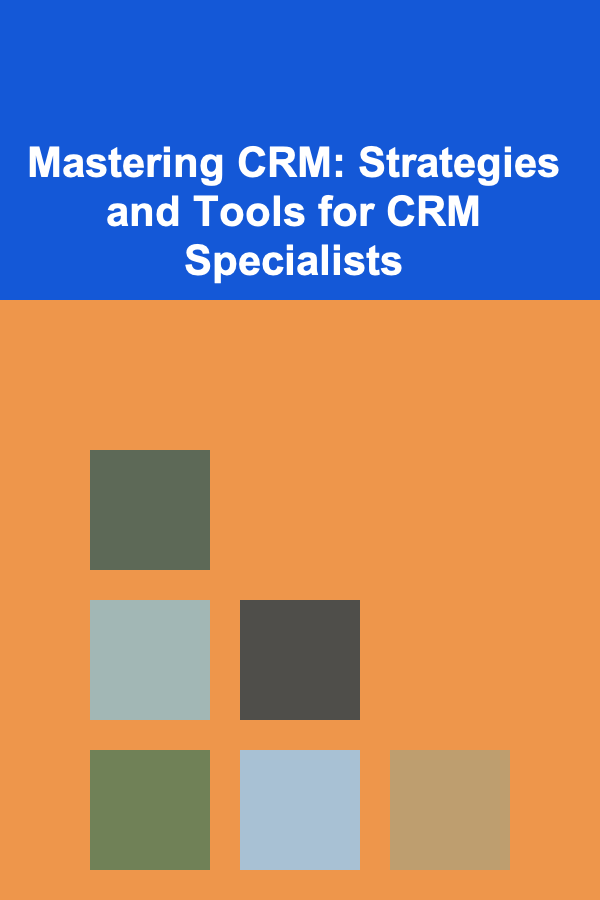
Mastering CRM: Strategies and Tools for CRM Specialists
ebook include PDF & Audio bundle (Micro Guide)
$12.99$10.99
Limited Time Offer! Order within the next:

In the fast-paced world of business today, Customer Relationship Management (CRM) has become a cornerstone for building and nurturing customer relationships. For CRM specialists, mastering the art of CRM requires more than just understanding the tools; it involves creating strategies that lead to exceptional customer experiences, better customer retention, and increased revenue. In this guide, we'll explore actionable strategies and essential tools for CRM specialists, helping you elevate your CRM practices and drive business growth.
Understanding the Role of a CRM Specialist
A CRM specialist is responsible for managing and optimizing customer interactions to improve customer satisfaction, loyalty, and overall business outcomes. This role involves:
- Implementing CRM systems to collect and analyze customer data.
- Segmenting customers based on their behavior and needs.
- Personalizing customer experiences across different touchpoints.
- Improving sales and marketing alignment using CRM tools.
- Analyzing CRM data to derive actionable insights for business decisions.
Being successful as a CRM specialist requires both technical proficiency with CRM platforms and strategic thinking to create and execute plans that focus on the customer journey.
Developing a CRM Strategy
To truly master CRM, you need to develop a strategy that goes beyond simply using a CRM tool. A comprehensive CRM strategy should align with the company's overall business goals while focusing on the customer experience at every stage of the customer lifecycle.
1. Define Clear Objectives
The first step in creating a CRM strategy is to define clear, measurable goals. These objectives should align with the broader business vision but focus on customer-related outcomes. Examples of CRM goals include:
- Increasing customer retention: Retaining existing customers is often more cost-effective than acquiring new ones.
- Improving customer satisfaction: Ensuring that customers have a seamless and pleasant experience at every touchpoint.
- Enhancing lead conversion rates: Turning more prospects into loyal customers.
- Maximizing customer lifetime value (CLV): Ensuring customers continue to purchase from your company over the long term.
Each goal should have clear KPIs (Key Performance Indicators) to measure success, such as customer satisfaction scores, sales conversion rates, or churn rates.
2. Customer Segmentation
One of the most powerful aspects of CRM is segmentation---the process of dividing your customer base into smaller, more manageable groups based on shared characteristics. Effective segmentation allows businesses to target their customers with more personalized and relevant messaging. As a CRM specialist, your job is to analyze data and create segments that can lead to more tailored and effective strategies.
Here are some common types of segmentation:
- Demographic Segmentation: Age, gender, income level, location, etc.
- Behavioral Segmentation: Based on customer interactions, purchasing patterns, and product usage.
- Psychographic Segmentation: Values, interests, lifestyles, and attitudes.
- Geographic Segmentation: Grouping customers based on geographic location, such as city, region, or country.
Once you've segmented your customer base, you can create targeted marketing campaigns, personalized product recommendations, and special offers for each group.
3. Personalization at Scale
Personalization is key to building stronger, long-term customer relationships. With a CRM system, you can use customer data to deliver tailored experiences, messages, and recommendations. Personalization helps customers feel understood and valued, which enhances loyalty and satisfaction.
CRM platforms can help automate personalized communication by triggering specific actions based on customer behavior. For instance:
- Email campaigns: Send personalized emails with offers or product recommendations based on past purchases.
- Website content: Display personalized content on your website based on the customer's browsing history.
- Customer service: Provide personalized support by referencing the customer's past interactions with the brand.
4. Automation and Efficiency
As a CRM specialist, you'll be dealing with large volumes of customer data. Using CRM tools to automate routine tasks can save time and ensure consistency. Automation can significantly improve both customer experience and operational efficiency.
Some key areas to automate in your CRM strategy include:
- Lead nurturing: Automatically send follow-up emails or promotional content to leads based on their behavior (e.g., downloading an e-book or viewing a product).
- Task reminders: Set up alerts or reminders for sales representatives to follow up with leads at appropriate times.
- Customer feedback collection: Automate the process of sending surveys or gathering feedback after key customer interactions (e.g., post-purchase or after customer service engagements).
Automation ensures that you never miss an opportunity to engage with a customer and helps streamline workflows across departments.
Leveraging CRM Tools and Platforms
To execute your CRM strategy effectively, you need the right set of tools. There are various CRM platforms available, each offering unique features designed to help specialists manage customer data, track interactions, and enhance the overall customer experience. Here are some essential tools and technologies that every CRM specialist should be familiar with:
1. CRM Software Platforms
The core of your CRM strategy will be the CRM software platform itself. Popular CRM platforms like Salesforce, HubSpot, Zoho CRM, and Microsoft Dynamics 365 offer a wide range of features, such as:
- Customer data storage: Centralized databases for storing contact information, purchase history, and communication logs.
- Automation tools: Built-in automation features for marketing campaigns, sales workflows, and customer service interactions.
- Analytics and reporting: Dashboards and reports that allow you to monitor key metrics like sales performance, customer behavior, and campaign effectiveness.
- Integration with other systems: The ability to integrate with email platforms, social media channels, and eCommerce systems to ensure that all customer touchpoints are connected.
2. Data Analytics and Reporting Tools
A CRM system generates a wealth of data. To truly understand your customers and optimize your CRM strategy, you need powerful analytics and reporting tools. Many CRM platforms come with built-in analytics capabilities, but specialized tools like Google Analytics, Tableau, or Power BI can help provide deeper insights.
With data analytics tools, you can:
- Track customer behavior: Understand how customers engage with your website, emails, and social media.
- Identify trends: Spot emerging patterns in customer preferences and behaviors.
- Measure campaign performance: Assess the effectiveness of marketing campaigns and adjust strategies accordingly.
3. Customer Support Tools
A CRM is not just for marketing and sales---it's also a powerful tool for improving customer support. Tools like Zendesk, Freshdesk, and Intercom help manage customer service tickets, track interactions, and ensure that customers receive timely, helpful support.
These tools can be integrated with your CRM platform to provide a 360-degree view of each customer, allowing support teams to provide more personalized assistance. They can also automate ticket management, categorize inquiries, and assign them to the appropriate team members.
4. Email Marketing Platforms
While many CRM systems offer basic email marketing capabilities, specialized email marketing tools like Mailchimp, Klaviyo, or ActiveCampaign offer more robust features for automation, segmentation, and tracking. These platforms allow you to:
- Design and send visually appealing emails.
- Create email lists based on customer segments.
- A/B test subject lines, content, and design for better results.
- Track email open rates, click-through rates, and conversions.
These tools ensure that your CRM-driven campaigns reach the right customers with the right message at the right time.
5. Social Media Management Tools
Social media is an essential part of modern CRM. Platforms like Hootsuite, Buffer, and Sprout Social help CRM specialists manage social media accounts, engage with customers, and track interactions across multiple channels. These tools offer features such as:
- Scheduling posts: Plan and schedule posts to maintain a consistent social media presence.
- Tracking social mentions: Monitor brand mentions and customer feedback on social platforms.
- Engagement tools: Respond to comments, messages, and reviews directly from the tool.
Integrating social media data with your CRM system helps you provide more responsive, personalized interactions.
Key Metrics for Measuring CRM Success
To evaluate the effectiveness of your CRM strategy, it's essential to track key performance indicators (KPIs) that align with your goals. Common CRM metrics include:
- Customer Satisfaction (CSAT): Measure how satisfied customers are with your products or services.
- Net Promoter Score (NPS): Assess customer loyalty and willingness to recommend your business to others.
- Customer Lifetime Value (CLV): Calculate the total revenue a customer generates over the course of their relationship with your business.
- Churn Rate: Track the percentage of customers who stop using your products or services during a given period.
- Conversion Rate: Measure the percentage of leads that convert into paying customers.
By monitoring these metrics, you can identify areas for improvement in your CRM strategy and optimize your efforts for better customer outcomes.
Conclusion
Mastering CRM is a continuous process of learning and adapting to customer needs, technological advancements, and evolving business goals. By developing a comprehensive CRM strategy, leveraging the right tools, and focusing on personalization and automation, CRM specialists can significantly enhance customer experiences, boost retention, and drive business growth.
Effective CRM is not just about the technology you use---it's about how you harness that technology to build meaningful, long-lasting relationships with your customers. By focusing on customer-centric strategies and utilizing powerful CRM tools, you can elevate your business and stay ahead of the competition.

How to Build a Balanced Investment Portfolio with ETFs
Read More
How to Build a Checklist for Generating Buzz and Creating Anticipation
Read More
How to Make Your Holiday Decorations Eco-Friendly
Read More
How to Stage Your Home with Art and Decor
Read More
How to Overcome Distractions in Meditation
Read More
How to Create a Printable Grocery Shopping To-Do List Template
Read MoreOther Products

How to Build a Balanced Investment Portfolio with ETFs
Read More
How to Build a Checklist for Generating Buzz and Creating Anticipation
Read More
How to Make Your Holiday Decorations Eco-Friendly
Read More
How to Stage Your Home with Art and Decor
Read More
How to Overcome Distractions in Meditation
Read More